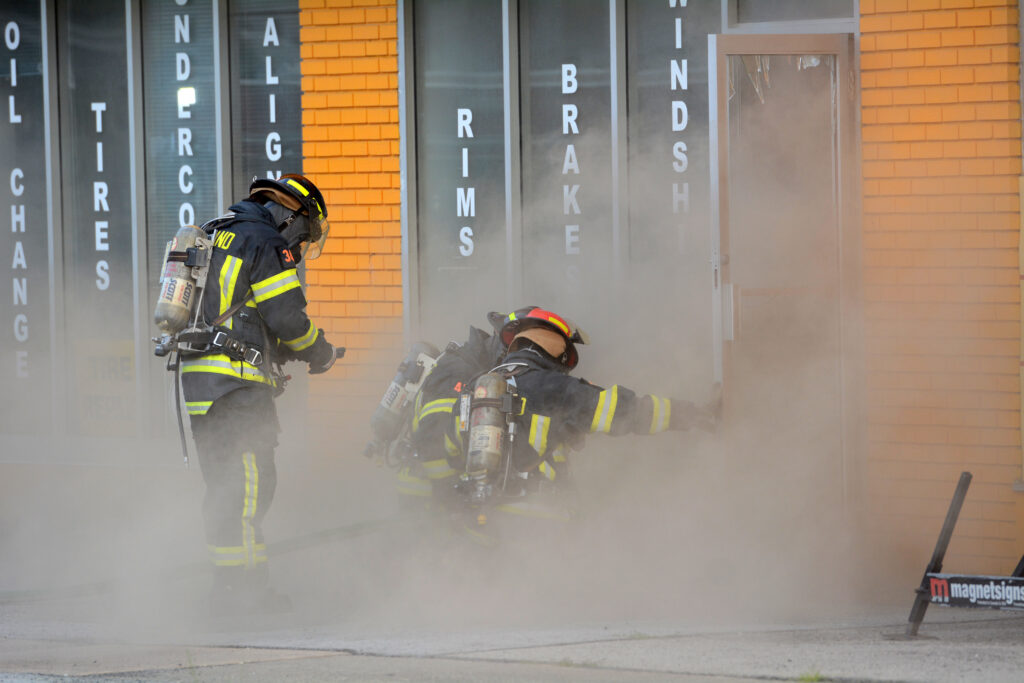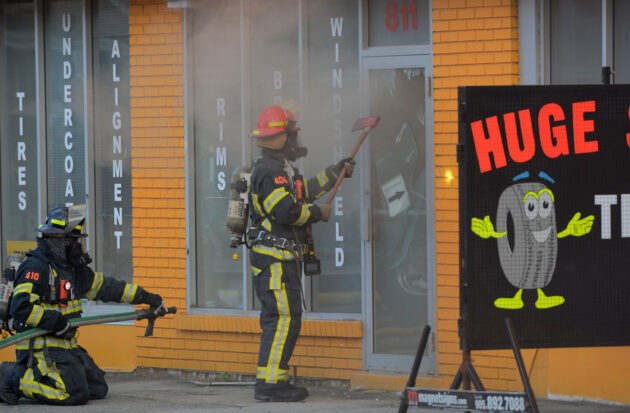
Educating to save a life: Creating a fire hall lecture to talk about a firefighter’s health risks
By Brittani Schroeder
Features canadian firefighter firefighter mental health wellness Photo credit: Dave Johnson
Photo credit: Dave Johnson In the spring of 2022, Craig Bowman’s life changed forever when he was diagnosed with stage four esophageal cancer after working in the fire service for over two decades. His 19-year-old daughter, Lexi, has since created a lecture and is attending fire halls to talk to firefighters about their increased risk of getting cancer. Editor Brittani Schroeder was able to speak with her about her journey.
Can you tell us about your family and what happened in 2022?
My dad is 47 years old and has been a professional firefighter for over 22 years. He was a captain acting platoon chief in Welland, Ont. My dad was healthy and our family had no history of cancer.
In May, he called my mom and said he was experiencing some back pain. An hour later, he called back and said after taking some pain meds, he was fine and could continue working.
The back pain was worse the next day, so he booked a doctor’s appointment. He thought maybe he had a kidney stone, and his doctor also thought that was the case. When he had bloodwork done, it came back looking like the pain was something cellular. After his doctor fast-tracked a lot of tests, we got the diagnosis that he had stage four esophageal cancer. This was less than two weeks after his symptoms started. If my dad had waited a week longer before seeing his doctor, he possibly wouldn’t be alive today.
My dad’s cancer was esophageal that had spread to his liver and lymph nodes. The tumor on his liver was four centimeters in size, with two other smaller tumors alongside it.
He was given chemotherapy right away. During the first round of chemo, he had bad side effects and so he was switched to a different chemotherapy. When that one didn’t work, he was switched back to the first chemo, but then that one stopped working. My dad went into liver failure. He was eventually told that he was unable to have any more treatment because the chemo stopped working and his liver enzymes had shot up. His doctor decided to do one more round of bloodwork, and somehow over the course of a few days his liver enzymes dropped. This allowed him to try more treatment. The new drug he’s on now is working really well.
Can you tell us about the research you’ve done since the diagnosis?
I started my research because I needed to understand why this was happening to my dad. I quickly learned that cancer is now the leading occupational illness for firefighters. According to the International Association of Fire Fighters (IAFF), over two thirds of Canadian firefighters will get cancer. Firefighters also have a 9 per cent higher risk of being diagnosed with cancer and a 14 per cent higher risk of dying from cancer than the general population.
Through Fire Fighting in Canada, I learned about medical oncologist Dr. Kenneth Kunz, who does extensive research into firefighters and their cancer risks. I was able to reach out to him, and he was nice enough to sit down and talk with me on the phone for over three hours about what my role can be in getting stuff done and spreading awareness.
Through his mentorship, I created a lecture to present at fire halls. I came from this state of being so angry that the science is out there, and now I’m in a place where I want to contribute to raising awareness and be part of that larger movement.
My dad keeps photos of my brother and I in his helmet as a reminder that he needs to make it home after each call. He told me he never imagined that cancer would be the reason he wouldn’t come home. If he knew that, he would have done everything in his power to stop it.

Craig Bowman, 47, pictured here in the red helmet, #404. Photo credit: Dave Johnson
Can you tell us about the lecture?
The lecture includes information on what the increased risk of cancer is, why firefighters are at an increased risk, how you can lower your risk through lifestyle changes, and how you can try to mitigate your increased risk. I go over the presumptive legislature laws, early detection methods, and how fire halls can be safely designed. I give them all the information they need to go on and make choices to lower their cancer risk and get screened.
So I’ve been making these lectures and presenting at fire halls, and just urging the firefighters to hear what I have to say. My next two appointments are at fire halls in Welland and Niagara Falls.
I want to contribute to raising awareness and be part of that larger movement.
What steps can be taken to help to inform firefighters?
In order to better study the types of cancers that firefighters can get, there needs to be a national registry of firefighters with cancer. This would include how old they were when they got it, when they were diagnosed and what stage they were, and how long they’d been in the fire service when they were diagnosed.
When it comes to presumptive legislature, there are currently 17 cancers listed for the province of Ontario, but these do not include a few cancers that could be caused by fire fighting—for example, laryngeal (throat) cancer is not included. But the main thing to note is that my research and conversations with Dr. Kunz indicate that a firefighter can get any kind of cancer. Carcinogens go anywhere once they are in the bloodstream.
Presumptive laws also dictate how many years of service you need to have under your belt to be considered to have a line of duty illness or death. For example, esophageal cancer requires 25 years of service, which is one of the highest on the list—most are around 10 years. But all of these numbers are arbitrary, because you can get cancer at any time. Unfortunately, this prevents many men and women from receiving the honour that they deserve in their illness or death, as well as their families from being financially stable. My dad is three years short of the 25-year requirement for esophageal cancer, and there’s an appeal process my family must go through because he was denied.
Presumptive laws are also provincial, but a fire in British Columbia is not more carcinogenic than a fire in Ontario, Saskatchewan, or Nova Scotia.
What is the most important piece of information you’d want to share?
Every firefighter thinks it’s not going to be them. My dad is young—he’s the perfect example to show that it can happen to anyone. And for him, he went from feeling fine to a stage four diagnosis in a matter of four to five days.
Special screening may cost you money, but getting regularly tested could save your life.
Editor’s Note: This interview has been condensed and edited for clarity. Thank you to Lexi Bowman, her brother Colin, her mother Alisen and her father Craig for sharing this story to help inform members of the fire service.
Print this page
Advertisement
- 25th Lambton County Fire trade show returns in new location
- Vintage vehicles destroyed in Hants County, N.S., garage fire